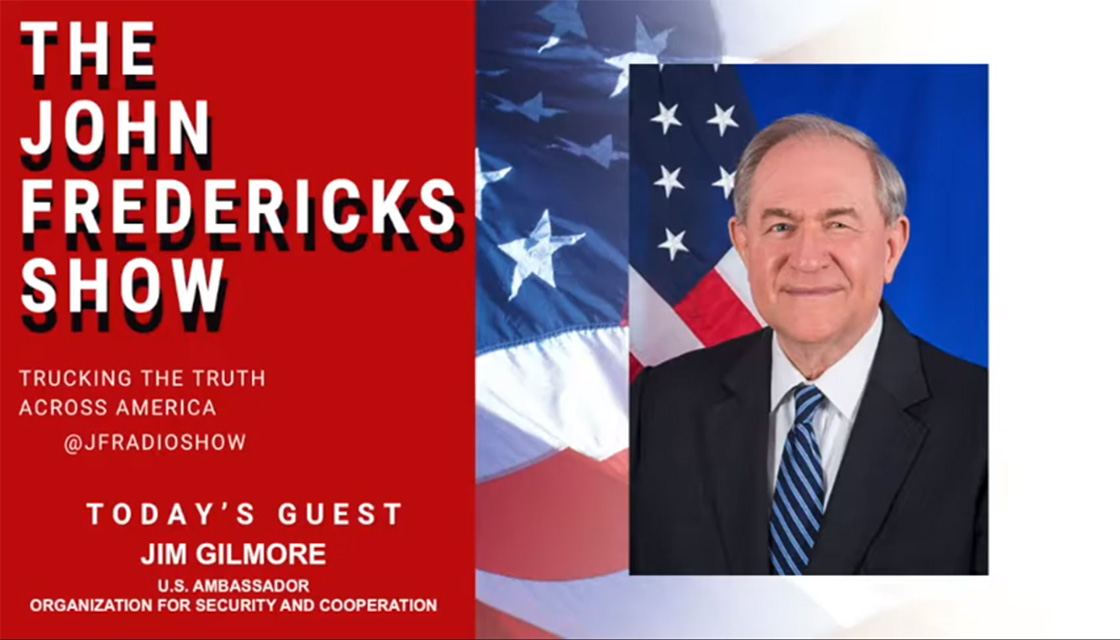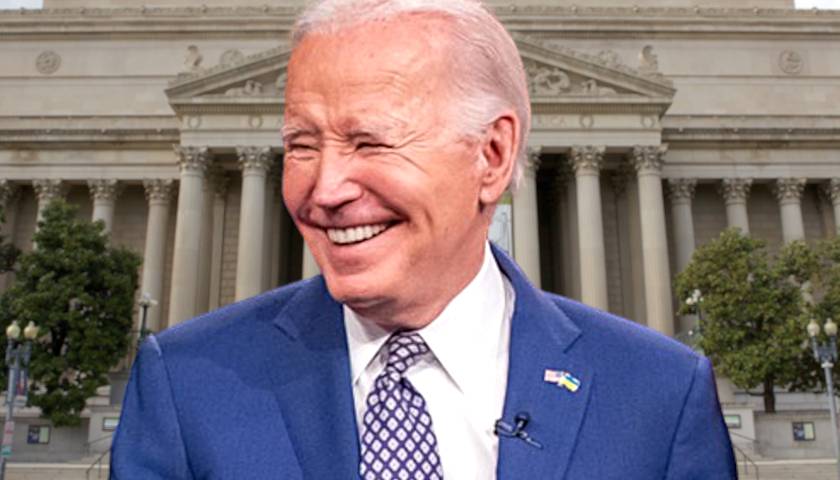Live from Virginia Wednesday morning on The John Fredericks Show – weekdays on WNTW AM 820/ FM 92.7 – Richmond, WJFN FM 100.5 – Central Virginia, WMPH AM 1010 / FM 100.1 / FM 96.9 (7-9 PM) Hampton Roads, WBRG AM 1050 / FM 105.1 – Lynchburg/Roanoke and Weekdays 6-10 am and 24/7 Stream – host Fredericks welcomed US Ambassador to the Trump administration Jim Gilmore to the show.
During the show, Ambassador Gilmore explained the current situation in Belarus and the next steps the OSCE will take to ensure a fair and legitimate repeat election that will be monitored in the name of democracy.
Fredericks: Joining us now live from Vienna Ambassador Jim Gilmore. You know Jim Gilmore. He ran for Senate, but he was governor when Republicans did actually win in Virginia. He was governor. Now he’s a US ambassador for the Trump administration for the Organization of Security and Operation. And he’s live in Vienna. Ambassador great to have you with us, sir.
Gilmore: Great to be on. And once again great to have a chance to talk to you about this diplomacy we are doing over here.
Fredericks: I know you are doing a lot of it. Talk to us about what is going on with Belarus?
Gilmore: The first thing I want to say to your listeners is to remember the importance that Europe is to American security. The US policy is to not allow a hostile power to dominate either the Pacific or Europe. That’s been our policy. And that’s our job over here, which is to try to prevent that from happening. The interesting issue we’ve got at OSC is Belarus.
That’s the fact that the dictator there, Lukashenko, stole the election, but he did it crudely. He declared he had an 80% vote, and that’s of course ridiculous. So he’s really saying to the people of Belarus, I’m going to steal your democracy, and I don’t even care if you know it.
Then what’s really happened now is hundreds of thousands of people have been demonstrating on the streets in Belarus, and they want freedom. They want their democracy, and they want a chance to elect their own people. They aren’t necessarily anti-Russian, and the United States isn’t anti-Russian in this situation. But our interests are always served when a country becomes more democratic and people can choose their own government. That’s certainly the American position. But its really bad right now.
The vote was fraudulent and once people began to object by going into the streets the government started arresting people, beating people, and torturing people, and abducting people. And now they’ve turned to taking the leadership of the opposition, and abducting them and then throwing them into other countries. Yesterday we had a case where Marina Kalashnikova was actually taken to the border, and they tried to throw her into the Ukraine, which is more or less a safe country. She tore up her passport and said she wouldn’t go. And I think that’s a real act of patriotism.
Fredericks: When you say the election was fraudulent, outline that for us, Mr. Ambassador, to your knowledge.
Gilmore: There is no evidence that the president of Belarus is supported by 80% of the people. That’s a near-unanimous thing. And the opposition was afforded 7% or 8%. It’s just ridiculous. The reports are that there was ballot stuffing.
That there were ballots that were presented for counting that were fraudulent and didn’t exist, but were there for the purpose of fattening up and adding to the numbers in precincts. That kind of behavior was going on. This is not a subtle thing. This is a straight-up miscounting and reporting of a fraudulent number in order to create a vote total. So that’s what complaints are, and that’s what the reports are everywhere from Belarus.
Fredericks: So then regular people took to the streets to protest that. Tell us about the protests. Have they been peaceful? Have they been violent?
Gilmore: No. Unlike the United States, they’ve actually been peaceful. They haven’t gone out there and attacked anybody. They haven’t attacked the police. They haven’t asserted that they wanted to do that. They haven’t done violence or vandalism or smashed windows or doing any of those kinds of things.
They are simply doing peaceful protests and carrying signs, because they just want a legitimate right to a democracy. That’s what they want to do. But the numbers have been very large, and it’s been very persistent. There was some concern that maybe with people being arrested and tortured, and that being so prominently displayed, that the people would be cowed and intimidated and would just stay home from now on. But that’s not happening.
People continue to go into the streets. OSCE is a very large security organization with 57 countries in it. But it includes not just the United States and its western allies, but it also includes Russia and Belarus. The principles that we all subscribe to are democracy, freedom, human rights, non-torture, non-abduction, and non-criminal activity.
Right now we are proposing that the three leaders of the organization, the past, future, and current chairpeople that they call the Troika, will go to Belarus to try to create some sense of stability and add to the safety within the country. So far the dictator has not invited our people to come in. So it’s just going to continue to fester for a while unless the OSCE can make a contribution to a peaceful resolution.
Fredericks: Well will the peaceful resolution include that the leader leaves the post?
Gilmore: I don’t think there is any choice here other than to have another election that is monitored internationally. The OSCE does monitor, but it requires time to prepare so the OSCE can pronounce the election legitimate. They were not given the invitation in time to be able to do that for this past election, and the result is an election that doesn’t confirm any legitimacy. OSCE could help in that regard.
The direct answer to your question is there is just going to have to be another election. And what I’ve said in my statement is look, Lukashenko, the fellow who is claiming to be the dictator of Belarus, times have changed, John. People are not any longer settling for that kind of thing here in the 21st century. This is not Checkoslavikia 1968 or Hungary in 1956.
This is not Stalin. The times have changed in Europe. People see too much information and have too much access to the internet, and they know what liberty actually is and they are demanding it. What I’ve said is look, the Belarus president is not going to be able to govern by doing a fraudulent election, and then beating up and abducting all the opposition and intimidating people. It just doesn’t work in the 21st century. It may take a little time to work it out, and it may take months or years, but the people of Eastern Europe are no longer going to settle for these kinds of things.
Fredericks: I got to tell you, Mr. Ambassador, you made a pretty determined tough statement on the Navalny alleged poisoning by what appears to be the Russian government. And in this statement you made, you really didn’t pull any punches with that. Can you elaborate on that?
Gilmore: Yes. I can’t resist comparing the actual democracy that is the United States. There have been a lot of silly statements about how the democracy is teetering in coups here and there and all that kind of thing. But in Europe, we actually see this stuff. The disturbing thing is that this is now an opposition figure in Russia that is seeking to emerge and to provide an actual independent political voice. And he was poisoned.
And this is not the first occasion of course. We saw the Russians in the United Kingdom who actually were poisoned also using the same poison. Its Novichok military-grade poison. And it was applied in the United Kingdom and now here we are seeing it again in Russia, where an opposition figure was poisoned in order to intimidate or destroy this independent voice.
So you are right. I just made a statement that it was reprehensible, and we did it at the primary council meeting at the OSCE, and I made this declaration in public and in front of all the other 57 countries. And I just said it was unacceptable and demanded an investigation. And in a separate security form, I did so today as a matter of fact, because the Russians pushed back and basically said it’s not us and we didn’t do it.
And they said, who could possibly gain from poisoning this guy. And of course, my retort on that was well you would (Fredericks chuckles) if you are trying to run a dictatorship and you are trying to destroy anybody else from emerging as an independent voice, you kill the guy. That not only ruins his voice, but anybody else that might consider coming out who would want to participate in Russian politics would be scared and intimated that they would be murdered.
Listen to the full show here:




